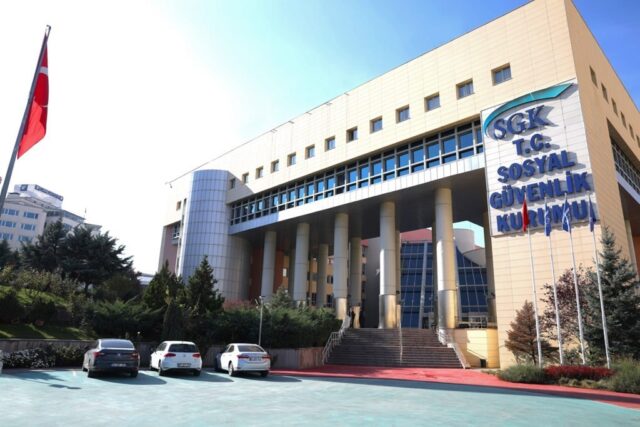The Turkish Social Security Institution (Sosyal Güvenlik Kurumu or SGK in Turkish) is a pivotal institution in Turkey’s social welfare system, ensuring the well-being and security of its citizens. Founded in 2006, the SGK plays a vital role in providing social insurance, healthcare, and pension services to the Turkish population. This piece aims to provide a general overview of the Turkish Social Security Institution, including its history, functions, organization, and its impact on the country’s social and economic landscape.
Historical Development
The roots of social security in Turkey can be traced back to the early 20th century during the Ottoman Empire, where rudimentary forms of social insurance were established.
However, the modern incarnation of the social security began to take shape by mid-20th century. The institution was formally established in 2006 by merging several previous organizations, including the Social Insurance Institution (Sosyal Sigortalar Kurumu or SSK), the Social Security Institution for the Self-Employed (Bağ-Kur), and the Retirement Fund of Turkey (Emekli Sandığı). Currently, Social Security Institution is responsible for management and overshight of the social insurance system and the General Healthcare Insurance of Turkey.
Functions of the SGK
- Social Insurance: The SGK administers social insurance programs for various categories of employees (both public and private employees) and self-employed individuals, ensuring that they are covered against the risks associated with disability, death, unemployment, and occupational diseases. It also manages the premiums and contributions for these programs.
- Financing the Healthcare Expenses: The SGK finances a comprehensive healthcare system that provides access to medical services for Turkish citizens. Through the General Health Insurance (Genel Sağlık Sigortası in Turkish) program, the institution covers financing of wide range of medical treatments and procedures, including hospital care, surgeries, prescription medications, and preventive care. The medial expenses covered within the system are regulated by the Social Security Institution’s Healthcare Application Communique.
- Pensions: The SGK is responsible for managing and disbursing pensions to retirees and their beneficiaries. The Turkish pension system offers several types of retirement benefits, including old-age pensions, disability pensions, and survivor’s pensions.
- Administrative Functions: The institution oversees the administrative aspects of social security, including the collection of premiums, contribution audits, unregistered employment audits, and ensuring compliance with social security regulations.
- Coordination of Social Security Agreements: Turkey has entered into various bilateral and multilateral social security agreements with other countries. Currently Republic of Turkey has 35 international social security agreements with different countries. The SGK coordinates these agreements, which help expatriates and international workers receive the social security benefits they are entitled to.

Organization and Structure of the SGK
The Turkish Social Security Institution is organized into various units and departments to efficiently carry out its functions. The institution’s structure includes a Central Organization, Provincial Directorates throughout all districts of Turkey, and a network of local service points.
Key departments within the central organisation of SGK include:
- Board of Directors: Responsible for managing the institution as the highest managing authority.
- General Directorate of Social Insurance: The general directorate is responsible for managing the social insurance programs and ensuring the collection of premiums.
- General Directorate of General Healthcare Insurance: The general directorate oversees the financing of healthcare services, including implementation and financing of the General Health Insurance program.
- General Directorate of Pension Services: Manages the disbursement of pensions to retirees and beneficiaries. Turkey has approximately 16 million pensioners as of the end of the year 2023.
- Strategic Development Department: While the unit manages the accountancy services of the institution, it also manages the strategic development of the whole social security system. The unit also coordinates international social security agreements and addresses cross-border issues.
Impact on Turkish Society and Economy
The Turkish Social Security Institution has had a significant impact on both Turkish society and the country’s economy. It has played a vital role in improving the overall well-being of the Turkish population by providing essential healthcare services and financial security during retirement. The institution has contributed to poverty reduction, enhanced access to healthcare, and increased the overall quality of life for many citizens. By governing the social insurance system of the country, the Social Security Institution governs an inter-generational solidarity model which is financed by premiums.
Addition to all, the SGK has had a positive influence on the Turkish economy. By facilitating a more secure and stable workforce, it has contributed to economic growth and stability. Social security programs have boosted domestic consumption and provided a safety net for those in need, ultimately promoting social and economic development.
Overall, the Turkish Social Security Institution, with its comprehensive range of social insurance, healthcare, and pension services, is a cornerstone of Turkey’s social welfare system. Its historical development, multifaceted functions, and organizational structure have made it a pivotal institution in the country’s effort to enhance the well-being and security of its citizens. The SGK’s impact on Turkish society and the economy is significant, as it continues to provide essential services and contribute to the nation’s overall progress and development.

